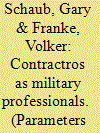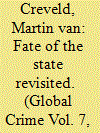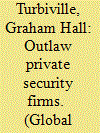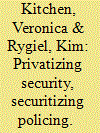|
|
|
Sort Order |
|
|
|
Items / Page
|
|
|
|
|
|
|
| Srl | Item |
| 1 |
ID:
094715


|
|
|
| 2 |
ID:
077330


|
|
|
|
|
| Publication |
2006.
|
| Summary/Abstract |
The State, which during the three and a half centuries since the Treaty of Westphalia (1648) has been the most important and the most characteristic of all modern institutions, appears to be declining or dying. In many places, existing states are either combining into larger communities or falling apart; in many places, organizations that are not states are challenging them by means fair or foul. On the international level, we seem to be moving away form a system of separate, sovereign, legally equal, states towards less distinct, more hierarchical, and in many ways more complex political structures. Inside their borders, it seems that many states will soon no longer be able to protect the political, military, economic, social and cultural life of their citizens. These developments are likely to lead to upheavals as profound as those that took humanity out of the middle ages and into the modern world. Whether the direction of change is desirable, as some hope, or undesirable, as others fear, remains to be seen.
|
|
|
|
|
|
|
|
|
|
|
|
|
|
|
|
| 3 |
ID:
115495


|
|
|
| 4 |
ID:
077344


|
|
|
|
|
| Publication |
2006.
|
| Summary/Abstract |
The thousands of large and small private security establishments operating around the world today continue to expand in number, diversity, and capability. Government oversight is often lacking, and the impact on local, national and regional security and stability may be substantial. In the most troubled areas, the pockets of security provided by private security regimens provide may mean the difference between a failed state and one that is at least faltering. However, the advantages of "private security firm cover" quickly became evident to criminals and groups with terrorist agendas as well. This assessment addresses numerous cases from around the world of private security establishments that were either formed for - or otherwise turned to - the pursuit of criminal or terrorist purposes. The stated jihadist intent to infiltrate such companies underscores the need for law enforcement and intelligence attention to the recruiting, affiliations and activities of these security enterprises
|
|
|
|
|
|
|
|
|
|
|
|
|
|
|
|
| 5 |
ID:
132387


|
|
|
|
|
| Publication |
2014.
|
| Summary/Abstract |
Allegations of police brutality, unlawful detention, and other breaches of civil liberties during the G20 in Toronto in June 2010 provide an important case through which to understand the changing nature of security and policing, raising questions about the political implications of such shifts in terms of police accountability, transparency, and democracy. Within the field of public policing, scholars predicted that globalization processes would weaken public policing as a dominant policing institution. Instead, it has expanded, in part, through the convergence of internal and international dimensions of security, whereby new policy networks cooperate in matters of policing and security in a new integrated model, the result of which is a further militarization of urban space and expanded markets for security, leading to the securitization of everyday life. This article examines the case of Toronto's hosting of the G20 and the role that the Integrated Security Unit-led by the RCMP and including private security firms-played. By focusing on the role of multilateral networks that include private sector actors, we examine the implications of the privatization and securitization of policing for democracy, citizenship, and accountability, looking at how they affect the ability of publics to engage in public debate, to consult, or to protest policies.
|
|
|
|
|
|
|
|
|
|
|
|
|
|
|
|
|
|
|
|
|